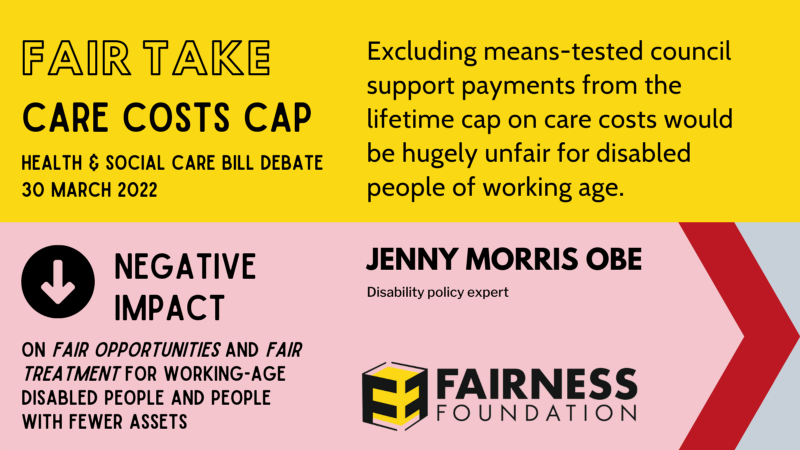Care costs, parole reform and the social contract
Last week we launched Fair Takes, a new series of comment articles on topical fairness-related issues, written by subject matter experts.
Thanks for reading.
Last week we launched Fair Takes, a new series of comment articles on topical fairness-related issues, written by subject matter experts. This newsletter summarises the first two articles in the series, as well as our event from last week on the social contract, headlined by Baroness Minouche Shafik, Director of LSE.
Fair Comment will be taking a break over Easter and will be back on 25 April.
Will Snell
Chief Executive
Fairness Foundation
PS: if you haven’t yet done so, please sign up to get Fair Comment in your inbox every Monday. Sign up for email updates
The care costs cap
Jenny Morris, Disability policy expert
The Health and Care Bill includes plans to exclude means-tested council support payments from the proposed £86,000 lifetime cap on care costs. This policy, if enacted, would be hugely unfair for disabled people of working age.
For years, the ‘problem’ of social care has been framed as the ‘catastrophic care costs’ faced by some older people who, if they need to enter residential or nursing care, have to sell their homes to pay for it, thus reducing their children’s inheritance. But the catastrophe for many working-age disabled people takes the form of years of poverty and a denial of opportunities. Excluding council support payments from the cap would embed this injustice as an integral part of the new funding regime for adult social care.
Parole review
Peter Dawson, Director, Prison Reform Trust
The Government has published a root and branch review of the parole system, meeting a manifesto commitment. It’s no accident that it did so on the day the Deputy Prime Minister announced that he was challenging the Parole Board’s decision to allow the release on licence of the woman convicted in 2009 of causing or allowing the death of “Baby P” in a case that would lay bare many failings of child protection practice.
This is about the fair fundamentals. Prisons really crystallise issues of fairness. Do we owe a duty of fairness to people who have murdered? Does stigma matter if enough people think it’s deserved? Should anyone care about prisoners while the victims of their crimes are suffering more than they are?
The social contract
A joint event with the Policy Institute at King’s College London as part of the Fair Society series
What does society owe each of us? And what do we owe in return? Our answer to these inescapable questions — known as the social contract — shapes our politics, economic systems and every stage of life, from raising children and going to school to finding work and growing old. Yet today, many believe that this contract is not working for them.
In What We Owe Each Other: A New Social Contract, leading economist and Director of the LSE, Minouche Shafik, examines societies across the world and demonstrates that the urgent challenges of technology, demography and climate require a major shift in priorities — a social contract fit for the 21st century.
Last week, we convened a panel of experts — Minouche Shafik, Diane Coyle, Daniel Susskind and Ryan Shorthouse — for a discussion of the issues raised in the book, chaired by Bobby Duffy. You can read a summary of discussion and watch a recording of the event on our website.
Read the summary or watch the recording
Poll of last week
We’re skipping this week’s poll because of the upcoming Easter break. But we can report on last week’s poll, when we asked what you think a fair society looks like. The results revealed an interesting split:
11%: everyone has the freedom and the responsibility to make the most of their lives, with minimal interference from government
21%: everyone has the opportunity to get on in life, and there are unequal outcomes because some people take more advantage of opportunities than others
34%: inequalities are completely eliminated, with the result that everyone has roughly the same resources and living standards
34%: inequalities are reduced, but not eliminated, because today’s high levels of inequality make it impossible to give people genuinely equal opportunities
Reads of the week
Patrick Butler outlines in The Guardian how statistics published last week show that the universal credit rise lifted 400,000 children out of poverty, and contrasts this with warnings that benefit cuts could push more than one million people below the breadline.
Jeremy Williams writes for The Conversation about five lessons the pandemic taught us about ending homelessness permanently (it’s realistic; scrapping eligibility criteria helps; collaboration is key; eviction bans work; and a clear mandate is needed).
Positive Money have published a report on the housing crisis, Banking on property, containing the results of YouGov polling. The surprising findings are that 54% of British homeowners would be happy if their own home did not rise in value in the next ten years if it meant houses were more affordable for those who don’t own property. The report recommends a range of policies to support a long-term housing affordability strategy, including changes to the Bank of England’s mandate, more action on rented and social housing, and fairer taxation of investment properties.
Speaking of public attitudes and property taxation, Fairer Share have released polling data that shows widespread support for replacing Council Tax and Stamp Duty with a Proportional Property Tax, which would be levied on the current value of properties rather than on 1991 levels. They suggest that this change could lead to bills falling for 77% of the country, with the average household likely to be £556 a year better off.
Gill Pay has launched The Gender Index, which is the largest research study into female entrepreneurship ever undertaken. It uses AI to report live data on more than four million active UK companies. Right now, just 16.8% of active UK companies are female-led. The report cites the 2019 Rose Review’s finding that an additional £250bn could be contributed to the UK economy simply by empowering more women to start and grow companies, and says that more needs to be done to support female-led companies to make the jump from small to medium and large size.
Sir Michael Marmot and colleagues at the UCL Institute of Health Equity, together with Legal & General, have published a new report, The Business of Health Equity. The report examines how businesses affect our health, and what they can do to improve health equity, through the pay, hours and conditions of work they provide for employees; through the products, services and investments that they offer customers and clients; and, more widely, by their influence on communities and wider society.
Angus Holford asks in The Conversation whether a graduate tax would be a better option than student loans, concluding that a “time-limited and income-linked graduate contribution” would be the best option.
Zsuszanna Chappell writes for Justice Everywhere about fatigue and the need for a social energy policy, arguing that ‘circadian injustice’ creates a vicious cycle in which marginalised and disadvantaged groups are both disproportionately affected by fatigue and prevented by fatigue and a lack of time from taking action to address the causes of the injustice.
If you haven’t yet done so, please sign up to be emailed Fair Comment every Monday. Sign up for email updates
Please suggest anything we should include in (or change about) Fair Comment. Suggest content or changes
You can read all of the previous editions of Fair Comment on our website. Visit our Fair Comment page
Originally published at https://fairnessfoundation.com.






